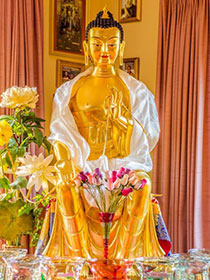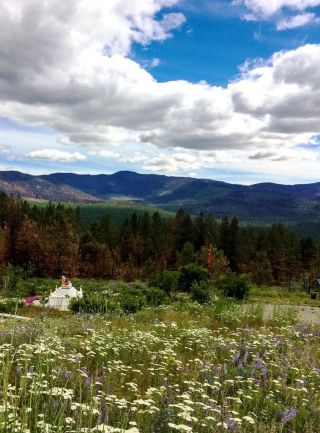- Home
- FPMT Homepage
Foundation for the Preservation of the Mahayana Tradition
The FPMT is an organization devoted to preserving and spreading Mahayana Buddhism worldwide by creating opportunities to listen, reflect, meditate, practice and actualize the unmistaken teachings of the Buddha and based on that experience spreading the Dharma to sentient beings. We provide integrated education through which people’s minds and hearts can be transformed into their highest potential for the benefit of others, inspired by an attitude of universal responsibility and service. We are committed to creating harmonious environments and helping all beings develop their full potential of infinite wisdom and compassion. Our organization is based on the Buddhist tradition of Lama Tsongkhapa of Tibet as taught to us by our founders Lama Thubten Yeshe and Lama Thubten Zopa Rinpoche.
- Willkommen
Die Stiftung zur Erhaltung der Mahayana Tradition (FPMT) ist eine Organisation, die sich weltweit für die Erhaltung und Verbreitung des Mahayana-Buddhismus einsetzt, indem sie Möglichkeiten schafft, den makellosen Lehren des Buddha zuzuhören, über sie zur reflektieren und zu meditieren und auf der Grundlage dieser Erfahrung das Dharma unter den Lebewesen zu verbreiten.
Wir bieten integrierte Schulungswege an, durch denen der Geist und das Herz der Menschen in ihr höchstes Potential verwandelt werden zum Wohl der anderen – inspiriert durch eine Haltung der universellen Verantwortung und dem Wunsch zu dienen. Wir haben uns verpflichtet, harmonische Umgebungen zu schaffen und allen Wesen zu helfen, ihr volles Potenzial unendlicher Weisheit und grenzenlosen Mitgefühls zu verwirklichen.
Unsere Organisation basiert auf der buddhistischen Tradition von Lama Tsongkhapa von Tibet, so wie sie uns von unseren Gründern Lama Thubten Yeshe und Lama Thubten Zopa Rinpoche gelehrt wird.
- Bienvenidos
La Fundación para la preservación de la tradición Mahayana (FPMT) es una organización que se dedica a preservar y difundir el budismo Mahayana en todo el mundo, creando oportunidades para escuchar, reflexionar, meditar, practicar y actualizar las enseñanzas inconfundibles de Buda y en base a esa experiencia difundir el Dharma a los seres.
Proporcionamos una educación integrada a través de la cual las mentes y los corazones de las personas se pueden transformar en su mayor potencial para el beneficio de los demás, inspirados por una actitud de responsabilidad y servicio universales. Estamos comprometidos a crear ambientes armoniosos y ayudar a todos los seres a desarrollar todo su potencial de infinita sabiduría y compasión.
Nuestra organización se basa en la tradición budista de Lama Tsongkhapa del Tíbet como nos lo enseñaron nuestros fundadores Lama Thubten Yeshe y Lama Zopa Rinpoche.
A continuación puede ver una lista de los centros y sus páginas web en su lengua preferida.
- Bienvenue
L’organisation de la FPMT a pour vocation la préservation et la diffusion du bouddhisme du mahayana dans le monde entier. Elle offre l’opportunité d’écouter, de réfléchir, de méditer, de pratiquer et de réaliser les enseignements excellents du Bouddha, pour ensuite transmettre le Dharma à tous les êtres. Nous proposons une formation intégrée grâce à laquelle le cœur et l’esprit de chacun peuvent accomplir leur potentiel le plus élevé pour le bien d’autrui, inspirés par le sens du service et une responsabilité universelle. Nous nous engageons à créer un environnement harmonieux et à aider tous les êtres à épanouir leur potentiel illimité de compassion et de sagesse. Notre organisation s’appuie sur la tradition guéloukpa de Lama Tsongkhapa du Tibet, telle qu’elle a été enseignée par nos fondateurs Lama Thoubtèn Yéshé et Lama Zopa Rinpoché.
Visitez le site de notre Editions Mahayana pour les traductions, conseils et nouvelles du Bureau international en français.
Voici une liste de centres et de leurs sites dans votre langue préférée
- Benvenuto
L’FPMT è un organizzazione il cui scopo è preservare e diffondere il Buddhismo Mahayana nel mondo, creando occasioni di ascolto, riflessione, meditazione e pratica dei perfetti insegnamenti del Buddha, al fine di attualizzare e diffondere il Dharma fra tutti gli esseri senzienti.
Offriamo un’educazione integrata, che può trasformare la mente e i cuori delle persone nel loro massimo potenziale, per il beneficio di tutti gli esseri, ispirati da un’attitudine di responsabilità universale e di servizio.
Il nostro obiettivo è quello di creare contesti armoniosi e aiutare tutti gli esseri a sviluppare in modo completo le proprie potenzialità di infinita saggezza e compassione.
La nostra organizzazione si basa sulla tradizione buddhista di Lama Tsongkhapa del Tibet, così come ci è stata insegnata dai nostri fondatori Lama Thubten Yeshe e Lama Zopa Rinpoche.
Di seguito potete trovare un elenco dei centri e dei loro siti nella lingua da voi prescelta.
- 欢迎 / 歡迎
简体中文
“护持大乘法脉基金会”( 英文简称:FPMT。全名:Foundation for the Preservation of the Mahayana Tradition) 是一个致力于护持和弘扬大乘佛法的国际佛教组织。我们提供听闻,思维,禅修,修行和实证佛陀无误教法的机会,以便让一切众生都能够享受佛法的指引和滋润。
我们全力创造和谐融洽的环境, 为人们提供解行并重的完整佛法教育,以便启发内在的环宇悲心及责任心,并开发内心所蕴藏的巨大潜能 — 无限的智慧与悲心 — 以便利益和服务一切有情。
FPMT的创办人是图腾耶喜喇嘛和喇嘛梭巴仁波切。我们所修习的是由两位上师所教导的,西藏喀巴大师的佛法传承。
繁體中文
護持大乘法脈基金會”( 英文簡稱:FPMT。全名:Found
ation for the Preservation of the Mahayana Tradition ) 是一個致力於護持和弘揚大乘佛法的國際佛教組織。我們提供聽聞, 思維,禪修,修行和實證佛陀無誤教法的機會,以便讓一切眾生都能 夠享受佛法的指引和滋潤。 我們全力創造和諧融洽的環境,
為人們提供解行並重的完整佛法教育,以便啟發內在的環宇悲心及責 任心,並開發內心所蘊藏的巨大潛能 — 無限的智慧與悲心 – – 以便利益和服務一切有情。 FPMT的創辦人是圖騰耶喜喇嘛和喇嘛梭巴仁波切。
我們所修習的是由兩位上師所教導的,西藏喀巴大師的佛法傳承。 察看道场信息:
- FPMT Homepage
- News/Media
-
- Study & Practice
-
-
- About FPMT Education Services
- Latest News
- Programs
- New to Buddhism?
- Buddhist Mind Science: Activating Your Potential
- Heart Advice for Death and Dying
- Discovering Buddhism
- Living in the Path
- Exploring Buddhism
- FPMT Basic Program
- FPMT Masters Program
- FPMT In-Depth Meditation Training
- Maitripa College
- Lotsawa Rinchen Zangpo Translator Program
- Universal Education for Compassion & Wisdom
- Online Learning Center
-
- Prayers & Practice Materials
- Overview of Prayers & Practices
- Full Catalogue of Prayers & Practice Materials
- Explore Popular Topics
- Benefiting Animals
- Chenrezig Resources
- Death & Dying Resources
- Lama Chopa (Guru Puja)
- Lama Zopa Rinpoche: Compendium of Precious Instructions
- Lama Zopa Rinpoche: Life Practice Advice
- Lama Zopa Rinpoche Practice Series
- Lamrim Resources
- Mantras
- Prayer Book Updates
- Purification Practices
- Sutras
- Thought Transformation (Lojong)
- Audio Materials
- Dharma Dates - Tibetan Calendar
- Translation Services
- Publishing Services
- Ways to Offer Support
- Prayers & Practice Materials
-
- Teachings and Advice
- Find Teachings and Advice
- Lama Zopa Rinpoche Advice Page
- Lama Zopa Rinpoche: Compendium of Precious Instructions
- Lama Zopa Rinpoche Video Teachings
- ༧སྐྱབས་རྗེ་བཟོད་པ་རིན་པོ་ཆེ་མཆོག་ནས་སྩལ་བའི་བཀའ་སློབ་བརྙན་འཕྲིན།
- Podcasts
- Lama Yeshe Wisdom Archive
- Buddhism FAQ
- Dharma for Young People
- Resources on Holy Objects
- Teachings and Advice
-
-
*If a menu item has a submenu clicking once will expand the menu clicking twice will open the page.
-
-
- Centers
-
- Teachers
-
- Projects
-
-
-
-
*If a menu item has a submenu clicking once will expand the menu clicking twice will open the page.
-
-
- FPMT
-
-
-
-
-
Karma is your experiences of body and mind. The word itself is Sanskrit; it means cause and effect. Your experiences of mental and physical happiness are the effects of certain causes, but those effects themselves become the cause of future results. One action produces a reaction; that is karma.
Lama Thubten Yeshe
-
-
-
- Shop
-
-
-
The Foundation Store is FPMT’s online shop and features a vast selection of Buddhist study and practice materials written or recommended by our lineage gurus. These items include homestudy programs, prayers and practices in PDF or eBook format, materials for children, and other resources to support practitioners.
Items displayed in the shop are made available for Dharma practice and educational purposes, and never for the purpose of profiting from their sale. Please read FPMT Foundation Store Policy Regarding Dharma Items for more information.
-
-
Lama Zopa Rinpoche News
16
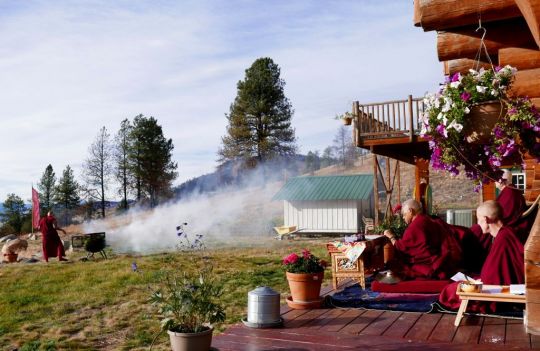
Lama Zopa Rinpoche and Sangha offering incense to benefit beings at Buddha Amitabha Pure Land, Washington State, USA, November 2016. Photo by Ven. Roger Kunsang.
How many ways are there to benefit other living beings?
At Buddha Amitabha Pure Land (BAPL) in Washington State, USA, Lama Zopa Rinpoche, resident Sangha, and visiting students take many measures to benefit the living beings—animals, insects, snakes, birds, and fish—who share the land and water there.
Rinpoche is always thinking of new ways to spread blessings, take away suffering, and help even the smallest creatures. These include the recitation of mantras, sutras, and prayers, as well as other activities. Many of these are described by Ven. Tharchin, a resident of BAPL, in a 25-minute YouTube video on FPMT’s YouTube channel (see below).
According to Rinpoche in his book Liberating Animals from the Danger of Death, sentient beings can experience purification of their karma and avoid the lower realms in the future as a result of such practices. Rinpoche says: “When the Buddha gave teachings to 500 swans in a field, in their next life they were born as human beings. They became monks and all became arya beings, able to achieve the cessation of suffering and the true path. So the result is unbelievable, just by hearing Dharma words.”
Watch Ven. Tharchin, a resident of Buddha Amitabha Pure Land, explain the many measures that are taken there to benefit living beings:
https://youtu.be/aqORZkZoAqQ
Benefiting animals is one of Lama Zopa Rinpoche’s Vast Visions for FPMT:
https://fpmt.org/fpmt/vast-vision/#animals
For more about FPMT’s activities to benefit animals see:
https://fpmt.org/tag/animals/
Get Liberating Animals from the Danger of Death as an e-book or in a print copy from the Foundation Store and support FPMT International Office:
https://shop.fpmt.org/Liberating-Animals-eBook_p_2334.html.
Lama Zopa Rinpoche is the spiritual director of the Foundation for the Preservation of Mahayana Tradition (FPMT), a Tibetan Buddhist organization dedicated to the transmission of the Mahayana Buddhist tradition and values worldwide through teaching, meditation and community service.
11
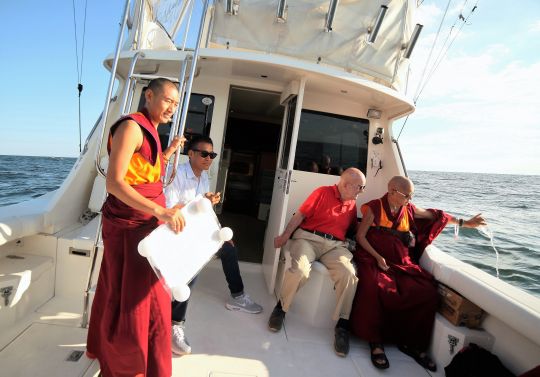
Lama Zopa Rinpoche pours blessed water into the Atlantic Ocean off New York, USA, August 2016. Ven. Sangpo is holding a laminated Namgyalma mantra in his hand in preparation for putting it into the ocean. Photo by Ven. Lobsang Sherab.
When Lama Zopa Rinpoche was in New York this past summer, he took the time to go out onto the Atlantic to bless the ocean. A kind friend offered his boat for a ride, and amid rough waves, Rinpoche and a few supporters took to the water. While some on the boat got seasick, Rinpoche did not.
Rinpoche poured blessed water from a Guru Rinpoche holy place in Bhutan into the ocean and held a mantra wheel filled with mantras on microfilm out over the ocean to help purify the negative karma of beings living in the water. As well, Namgyalma mantras were placed on the surface; some floated and some sank. The Namgyalma mantras had been prepared under Rinpoche’s instructions, and each has mantras in Tibetan on one side, while the other side has a description in English of what the mantras are so that anyone finding them does not throw them away. They are laminated in plastic to withstand the water. Once in the ocean, the mantras continually bless all the living beings that come into contact with the water.
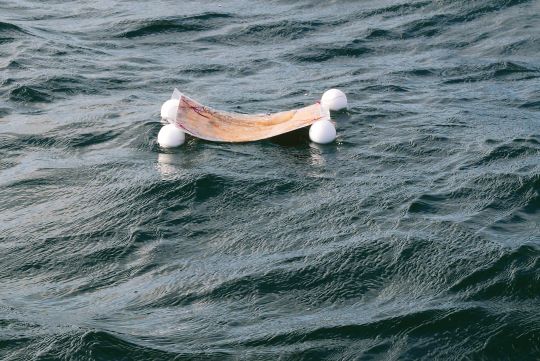
One of the Namgyalma mantras floating on the Atlantic ocean off New York, August 2016
What are the benefits of the Namgyalma mantra? Says Lama Zopa Rinpoche: “There are unbelievable, unbelievable benefits to this mantra.” He explains, “Namgyalma is a deity for long life and purification. The mantra has infinite benefits; it is so powerful. It is said that for anyone who hears this mantra, this will be the last time that person is born in the womb. If animals hear it, they will not be reborn in the lower realms ….” Wind or water that touch the mantra, he says, will bless and purify sentient beings.
Watch Lama Zopa Rinpoche describe the motivation for blessing beings in the ocean and the ways of blessing them on YouTube:
https://youtu.be/vex–9nBBBY
Read more about Lama Zopa Rinpoche blessing living beings around the world with the Namgyalma mantra:
https://fpmt.org/tag/namgyalma-mantra/
Watch a short video about the benefits of the Namgyalma mantra:
https://fpmt.org/mandala-today/the-benefits-of-the-namgyalma-mantra-video/
Or, read an article about the benefits of the Namgyalma mantra:
https://fpmt.org/mandala/archives/mandala-issues-for-2008/august/the-benefits-of-namgyalma-mantra/
For more about FPMT’s activities to benefit animals see:
https://fpmt.org/tag/animals/
Get Liberating Animals from the Danger of Death as an e-book or in a print copy from the Foundation Store and support FPMT International Office:
https://shop.fpmt.org/Liberating-Animals-eBook_p_2334.html.
Lama Zopa Rinpoche is the spiritual director of the Foundation for the Preservation of Mahayana Tradition (FPMT), a Tibetan Buddhist organization dedicated to the transmission of the Mahayana Buddhist tradition and values worldwide through teaching, meditation and community service.
- Tagged: animals, lama zopa rinpoche, namgyalma mantra
- 0
9
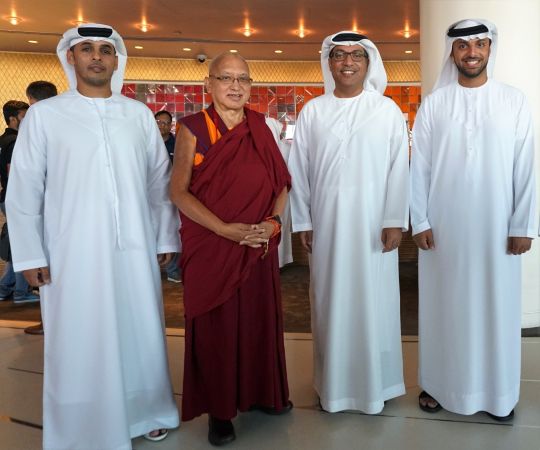
Lama Zopa Rinpoche meets some new friends in Abu Dhabi, United Arab Emirates, on his way to Nepal, November 2016. Photo by Ven. Lobsang Sherab.
“[It would be good] for the centers to arrange regular interfaith dialogues with religious leaders in their local community,” encouraged Lama Zopa Rinpoche when he developed his Vast Visions for FPMT, noting that this is one way FPMT can offer service to His Holiness the Dalai Lama and support his aims.
On the subject of other religions, Rinpoche wrote in a letter to a student in 2013, “As His Holiness the Dalai Lama says, all religions that have conduct and views as their main instruction are telling people to have a good heart and love and compassion for the living beings. That is the main focus, and it is the same for many religions. So the conclusion is the same, to generate loving kindness and compassion to others, to not harm and to benefit others. It’s the same in Buddhism and the other major religions … I want to say the most important thing is to develop compassion for all living beings.”
Elsewhere, Rinpoche has explained, “There are many religions in the world, such as Christianity, Hinduism, Islam, and so forth. These different religions are needed. It’s like having different clothes or different kinds of food in a restaurant; we need variety for different people. Christianity is needed for people who have the karma to devote themselves to Christianity and Hinduism is needed for those who have the karma to devote themselves to Hinduism and so forth. We must respect other religions … because many people in the world need Christianity and the other religions for their happiness. Therefore we must respect that.”
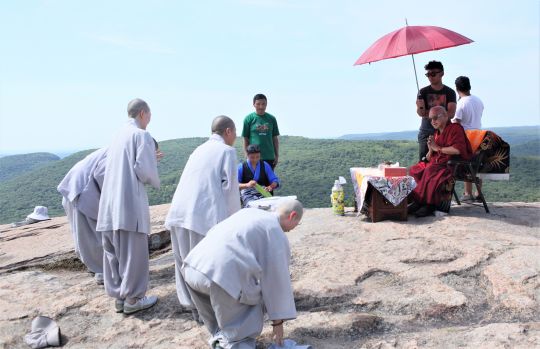
Lama Zopa Rinpoche greets Korean Sangha in New York, USA, July 2016. Photo by Ven. Lobsang Sherab.
While we need to have deep respect for all religions, Buddhism—since we have the karma for it—is still tremendously precious. On the subject of Buddhist practice, Lama Zopa Rinpoche explained in 2012, “From the three principal aspects of the path to enlightenment we can realize all the paths of Buddhism. We can achieve not only temporary happiness but also the happiness of future lives and ultimate happiness: liberation from samsara and full enlightenment. We are so lucky that we have met these teachings.”
Read more about Lama Zopa Rinpoche’s vast visions for FPMT at:
https://fpmt.org/fpmt/vast-vision/
Lama Zopa Rinpoche is the spiritual director of the Foundation for the Preservation of Mahayana Tradition (FPMT), a Tibetan Buddhist organization dedicated to the transmission of the Mahayana Buddhist tradition and values worldwide through teaching, meditation and community service.
- Tagged: interfaith, Islam, lama zopa rinpoche
- 0
2
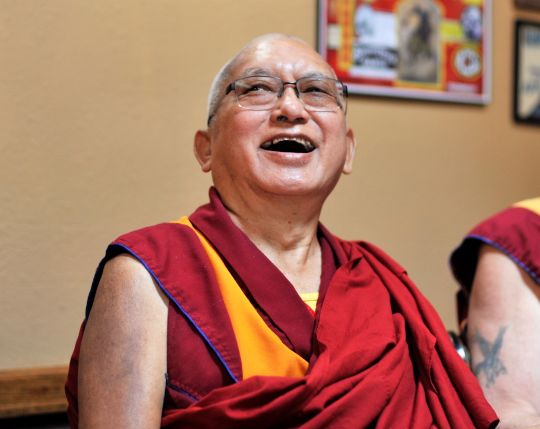
Lama Zopa Rinoche enjoying himself at a restaurant, Washington State, USA, September 2016. Photo by Ven. Lobsang Sherab.
Should we be happy?
In a letter to a student, Lama Zopa Rinpoche once wrote,” I think the most important thing is that you’re happy … I’m talking about the happiness that you can develop from life to life, up to enlightenment. This happiness can be completed; it is so meaningful. Whatever you do in the world, this is the essence. This happiness is Dharma.”
In his book The Heart of the Path: Seeing the Guru as Buddha, Lama Zopa Rinpoche explains one reason to be happy: that we have genuine teachers to guide us. “Even though we may not recognize it, all our happiness comes from our gurus. Every single good thing—past, present, and future—comes from our gurus. There is no doubt that the more we learn and practice Dharma, the more we develop our compassion and our wisdom and the more we are able to benefit other sentient beings. We are able to bring deeper and deeper benefit to others. All this comes from the kindness of the guru.”
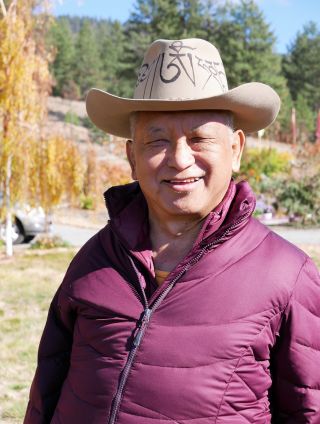
Lama Zopa Rinpoche wearing his mantra hat and joking with Sangha at Buddha Amitabha Pure Land, Washington State, USA, November 2016. Photo by Ven. Roger Kunsang.
He adds, “In this life, we can not only achieve any happiness we want—the happiness of future lives, liberation from samsara, and enlightenment—but we can achieve all of these three great meanings in each second. For example, if even without bodhichitta motivation we circumambulate or make offerings or prostrate to a statue, stupa, or scripture of Buddha, just through the power of the holy object we create the cause of enlightenment and, by the way, liberation from samsara and all the happiness of future lives. All this comes about through the kindness of the guru.”
“Without our gurus,” Rinpoche concludes, “there is no way that we could even leave an imprint on our mind by hearing the words of Dharma let alone meditate on the path to enlightenment or attain realizations. Not everyone has this chance—in fact, only a very small number do … Even though we might not now be able to attain realizations, sooner or later, because of the imprints, we will be able to have complete understanding of the words and their meaning and be able to actualize the path. Through this, we will then achieve enlightenment.” Isn’t that a reason to be happy?
A happy new year of joy and rejoicing to all!
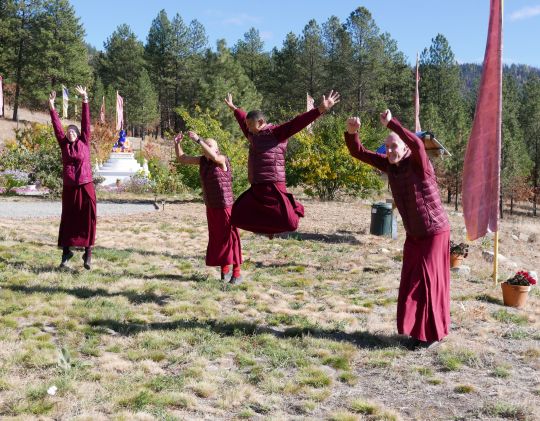
Sangha jumping for joy at Buddha Amitabha Pure Land, Washington State, USA, November 2016. Photo by Ven. Roger Kunsang.
Get the e-book or a print copy of The Heart of the Path: Seeing the Guru as Buddha from the Foundation Store and support FPMT International Office:
https://shop.fpmt.org/Heart-of-the-Path-eBook_p_2360.html
Lama Zopa Rinpoche is the spiritual director of the Foundation for the Preservation of Mahayana Tradition (FPMT), a Tibetan Buddhist organization dedicated to the transmission of the Mahayana Buddhist tradition and values worldwide through teaching, meditation and community service.
- Tagged: guru devotion, lama zopa rinpoche, rejoicing
- 0
1
Long Life Puja for Lama Zopa Rinpoche on January 2, 2017
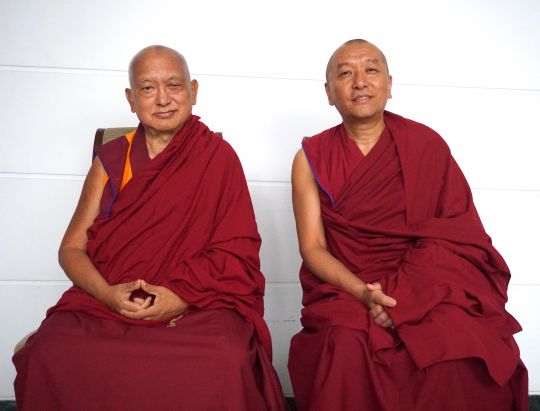
Lama Zopa Rinpoche with the new abbot of Sera Je Monastery, Khen Rinpoche.
A long life puja will be offered to Lama Zopa Rinpoche on behalf of Sera Je Monastery as requested by Abbot Khen Rinpoche, on the Maitreya Project land in Bodhgaya on January 2, 2017 starting in the afternoon.
You can watch a beautiful video of the 2012 long life puja for Lama Zopa Rinpoche offered in Bodhgaya by Sera Je Monastery:
www.youtube.com/watch?v=BLbfQjE4rRU
Those in Bodhgaya are welcome to attend this long life puja for Lama Zopa Rinpoche on the Maitreya Project land. And those unable to attend, please rejoice in the auspicious occasion to ceremoniously gather, pray, and request Rinpoche to live among us for a very long time.
Lama Zopa Rinpoche is the spiritual director of the Foundation for the Preservation of Mahayana Tradition (FPMT), a Tibetan Buddhist organization dedicated to the transmission of the Mahayana Buddhist tradition and values worldwide through teaching, meditation and community service.
- Tagged: long life, long life puja
- 0
28
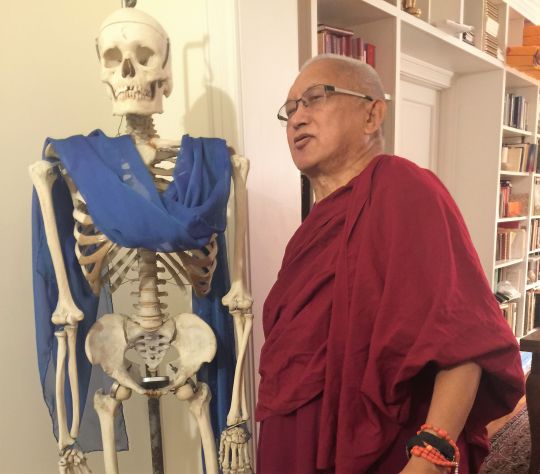
Lama Zopa Rinpoche recites mantras to bless a skeleton, New York, USA, August 2016
When he visited New York this past summer, Lama Zopa Rinpoche encountered a skeleton. To benefit the person whose the skeleton it had been, he offered blessings and mantras (see video below). The skeleton, he pointed out, should remind everyone of the inescapability of impermanence and death.
“It’s not certain which will come first—tomorrow or the next life,” Rinpoche says in his book Kadampa Teachings, quoting from Shantideva’s A Guide to the Bodhisattva’s Way of Life, explaining that, “rather than working for tomorrow, it is better to work for the next life.” He adds, “Tomorrow is uncertain, but our next life will definitely happen, and it could happen at any time. Therefore, we should work for the happiness of that future life. This is why it’s so important to practice Dharma.”
“You can’t just relax, saying ‘I’m not going to die today,’” he comments, quoting again from A Guide to the Bodhisattva’s Way of Life. “You can’t sign a guarantee that you’re not going to die today. You can’t really see what is going to happen to you, not even in the next hour or the next minute. It’s totally dark. Since you can’t see what’s going to happen, how could you guarantee that you’re not going to die today? The thought that you’re going to live for a long time continues even to the day of your death … It’s not true, and it cheats you.”
Watch Lama Zopa Rinpoche reciting mantras to the skeleton on YouTube:
https://youtu.be/y1hKN9VioaQ
Read more from Kadampa Teachings on the Lama Yeshe Wisdom Archive:
https://www.lamayeshe.com/article/chapter/kadampa-teachings
Get the e-book or a print copy of Kadampa Teachings from the Foundation Store and support FPMT International Office:
https://shop.fpmt.org/Kadampa-Teachings–Hard-Copy_p_1283.html
Lama Zopa Rinpoche is the spiritual director of the Foundation for the Preservation of Mahayana Tradition (FPMT), a Tibetan Buddhist organization dedicated to the transmission of the Mahayana Buddhist tradition and values worldwide through teaching, meditation and community service.
26
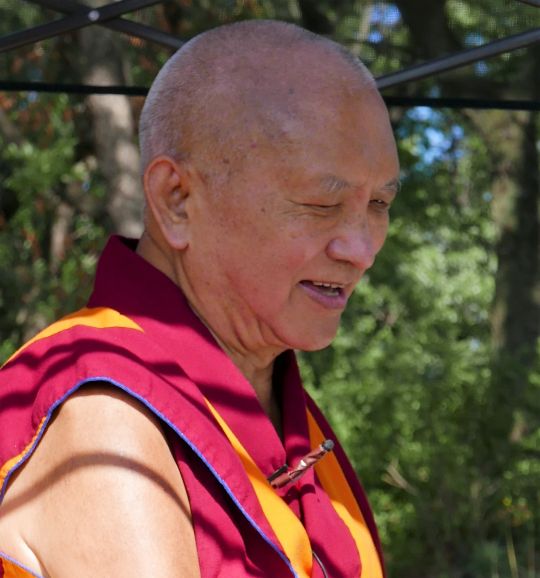
Lama Zopa Rinpoche teaching during a picnic in the park, New York, USA, August 2016. Photo by Ven. Roger Kunsang.
While he was in New York this past summer, Lama Zopa Rinpoche took a few minutes to explain the six-syllable mantra AH AAH SHA SA MA HA.
In an informal conversation, Rinpoche held up a card on which he had written this mantra in Tibetan. The front of the card has a cat picture and reads, “I’m the incarnation of all your cats who have died—that’s why OM MANI PADME HUM comes from my mouth!” Rinpoche reads this and then the AH AAH SHA SA MA HA mantra he has inscribed below it, then the inside of the card in which he has written, “It’s all over Solu Khumbu carved on the rocks and it’s called the ‘six syllables of clairvoyance.’ And if you see this mantra, after fifteen days, the heavy negative karmas get purified, so it has a very profound meaning.”
Watch Lama Zopa Rinpoche explain the six-syllable mantra of clairvoyance on YouTube:
https://youtu.be/o11zaq5Q1VY
The six-syllable mantra, which has also been called the mantra that “just by seeing you become enlightened,” is explained as having the potential to liberate those born in the lower realms and to bless and purify the environment. Lama Zopa Rinpoche advises the following: “Put this mantra in your house where people can see it—in the dining room or kitchen, inside or outside. You can also put it by the road or on signposts. Just by seeing this mantra, sentient beings move closer to enlightenment and their negative karma is purified, even without their knowledge.”
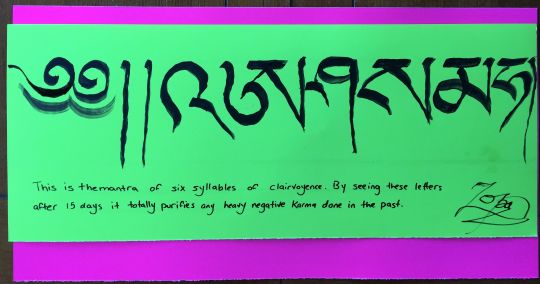
The mantra of the six syllables of clairvoyance, written by Lama Zopa Rinpoche. Rinpoche asked for this sign to be displayed indoors and outdoors to leave imprints on the beings that see it. Washington State, USA, 2016. Photo by Ven. Roger Kunsang.
Read more about this mantra on Lama Yeshe Wisdom Archive:
https://www.lamayeshe.com/advice/new-mantra-and-its-benefits
Lama Zopa Rinpoche is the spiritual director of the Foundation for the Preservation of Mahayana Tradition (FPMT), a Tibetan Buddhist organization dedicated to the transmission of the Mahayana Buddhist tradition and values worldwide through teaching, meditation and community service.
- Tagged: lama zopa rinpoche, mantras, six syllable of clairvoyance, six syllables of clairvoyance mantra
- 0
19
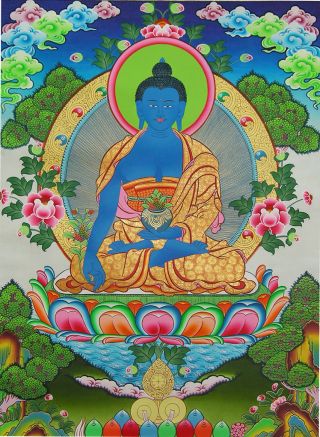
Medicine Buddha. Photo courtesy of FPMT Education Services.
There is starvation in Nigeria, and people are dying.
Lama Zopa Rinpoche recently checked on what is best to be done in Nigeria, where so many people are dying of hunger. It seems that this is due in part to extremists preventing food and aid from reaching people in need. According to Save the Children, up to half of all children under five are acutely malnourished in some areas of north-east Nigeria, where it is feared 200 children could die every day.
While Rinpoche considered making a donation to help the starving people, he then did a divination to check what was best. The result? Students of Rinpoche who are concerned about Nigeria should do the extensive Medicine Buddha puja, making strong prayers to Medicine Buddha for those affected to be free of hunger and oppression.
Get the e-book or a print copy of the puja recommended by Lama Zopa Rinpoche, called The Wish-Granting Sovereign, from the Foundation Store :
https://shop.fpmt.org/Medicine-Buddha–The-Wish-Granting-Sovereign-PDF_p_1901.html
Lama Zopa Rinpoche is the spiritual director of the Foundation for the Preservation of Mahayana Tradition (FPMT), a Tibetan Buddhist organization dedicated to the transmission of the Mahayana Buddhist tradition and values worldwide through teaching, meditation and community service.
- Tagged: lama zopa rinpoche, medicine buddha, nigeria
- 0
17

Lama Zopa Rinpoche enjoying a vegetarian lunch with Ven. Thupten Wongmo, Buddha Amitabha Pure Land, Washington State, USA, October 2016. Photo by Ven. Roger Kunsang.
How can we save animals?
Ven. Thupten Wongmo, a nun who lives at Buddha Amitabha Pure Land (BAPL), is a vegetarian because of what Lama Zopa Rinpoche told her many years ago: “It’s best to avoid eating meat out of compassion. Before eating the meat, think of where it came from, through cutting an animal’s neck, against its will, and how much suffering the animal experienced. After thinking about that, you can’t eat the meat! Meat may be nice for the person eating it, but not for the animal who suffered so much and didn’t die naturally. You can say prayers for the animal that was killed, but if you eat the meat, you are still playing a small part in the death of the animal. If everyone stopped eating meat, then no more animals would be killed for that purpose.”
Rinpoche prefers to avoid eating meat and has often spoken in favor of vegetarianism. Ven. Wongmo reports that some time ago Rinpoche said that she could one day cook him “some rice.” Finally, in October 2016, she mustered up her courage—not being a confident cook—and prepared him a vegetarian lunch.
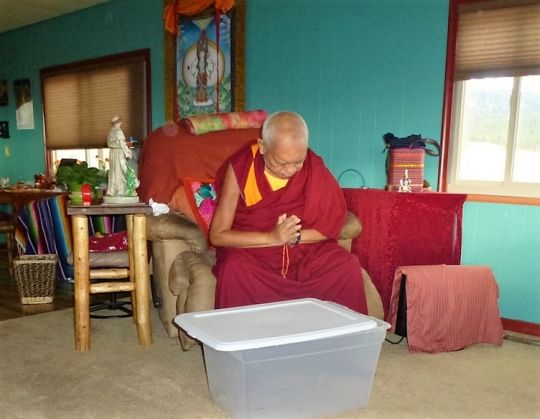
Lama Zopa Rinpoche says prayers, Buddha Amitabha Pure Land, Washington State, USA, November 2016. Photo by Ven. Wongmo.
After enjoying the meatless meal, Rinpoche took another action to save animals: he kindly blessed “her mouse”—one of hundreds she has captured at BAPL and one of countless animals, birds, fish, and insects that have been been blessed there by the recitation of mantras, sutras, and prayers, as well as other activities. The mouse, which was inside a large plastic container with food, water, and a soft cloth, was able to listen while Rinpoche recited at length various mantras, including the Chenrezig mantra, the Medicine Buddha mantra, the short Namgyalma mantra, the Lotus Pinnacle mantra, and others, as well as various prayers. Ven. Wongmo also played Recitations for Animals and Sanghata Sutra CDs for the mouse, as she does for all the mice she catches.
All of these are among the many, many actions that are taken at BAPL by Rinpoche when he is present and by the Sangha and visitors on a regular basis to help animals, birds, fish, and insects. These include Ven. Wongmo’s mice and a recent visitor—a snake Rinpoche named Jangsem (Tibetan for “Bodhichitta”).
Watch Lama Zopa Rinpoche on YouTube as he recites prayers to benefit Jangsem the snake and all other sentient beings:
https://www.youtube.com/watch?v=pZ-WoBgM6eg
Benefiting animals is one of Lama Zopa Rinpoche’s Vast Visions for FPMT:
https://fpmt.org/fpmt/vast-vision/#animals
Read more about FPMT’s activities to encourage vegetarianism on FPMT.org:
https://fpmt.org/tag/vegetarianism/
For more about FPMT’s activities to benefit animals see:
https://fpmt.org/tag/animals/
Get Liberating Animals from the Danger of Death as an e-book or in a print copy from the Foundation Store and support FPMT International Office:
https://shop.fpmt.org/Liberating-Animals-eBook_p_2334.html.
Lama Zopa Rinpoche is the spiritual director of the Foundation for the Preservation of Mahayana Tradition (FPMT), a Tibetan Buddhist organization dedicated to the transmission of the Mahayana Buddhist tradition and values worldwide through teaching, meditation, and community service.
- Tagged: animals, vegan, veganism, vegetarianism
- 0
14
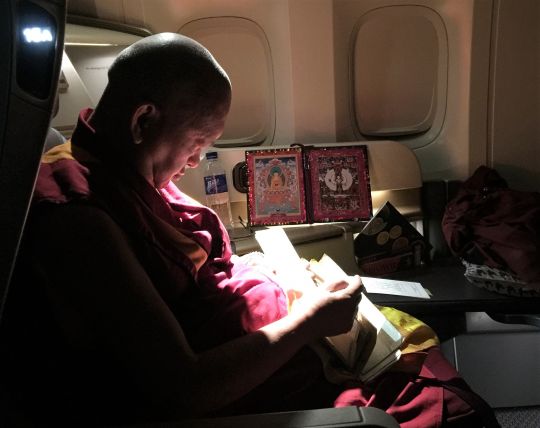
Lama Zopa Rinpoche traveling by air, 2016
The holiday season has arrived and with it the prospect of traveling, whether to go home or away, to spend time with family and friends.
The following advice from Lama Zopa Rinpoche describes what to do before traveling in order to have a safe and successful trip:
Instructions to Accomplish All Success Wherever You Go
At the beginning, when you enter the road to depart, remember and prostrate to all the buddhas and bodhisattvas who are in the ten directions, particularly those buddhas and bodhisattvas in the direction (you are going).
Then make strong requests for the success of all your wishes and then recite seven times:
NAMO BUDDHAYA / NAMO DHARMAYA / MAMA SARWA ARTHA SITAYE SVAHA (7X)
This will accomplish all your works exactly according to your wishes without obstacles.
The next practice is done particularly in the case where you have to do something on a wrong date, wrong star, or wrong time. This practice pacifies the shortcomings of time, date, star and so forth, and to accomplish success. Remember the buddhas and bodhisattvas who are in the direction where you are going. Put the palms together and recite:
I prostrate to the Three Rare Sublime Ones (Buddha, Dharma, Sangha).
I prostrate to the Tathagata, Enemy-Destroyer, the Owner of the Date, Star, Moment.
TADYATHA NAGA DRE NAGAPATI SARWA TITI MUHURTATI NAGA DRA NAMA SADUNTE NI BAWENTU SVAHA (3X)
Recite this three times, then all your works will succeed.
Advice translated by Lama Thubten Zopa Rinpoche at Deer Park in Madison, Wisconsin on July 24, 1999. Scribed by Diana Finnegan. Source of text unknown.
Watch Lama Zopa Rinpoche on YouTube walk through the Singapore airport unassisted on the way to the USA from Bhutan, June 2016:
https://www.youtube.com/watch?v=SF7JE7dg2vk
Find more advice for traveling at Lama Yeshe Wisdom Archive:
https://www.lamayeshe.com/advice/travel-and-immigration
Lama Zopa Rinpoche is the spiritual director of the Foundation for the Preservation of Mahayana Tradition (FPMT), a Tibetan Buddhist organization dedicated to the transmission of the Mahayana Buddhist tradition and values worldwide through teaching, meditation, and community service.
12
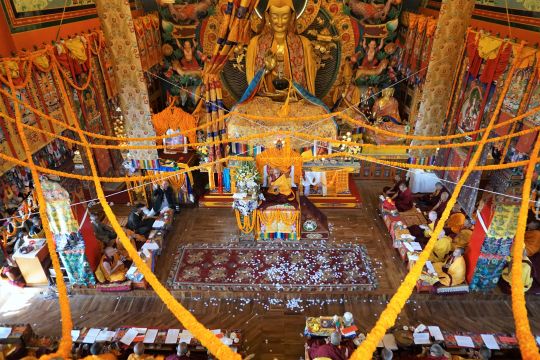
Lama Zopa Rinpoche during the long life puja he was offered on the last day of Kopan Monastery’s November course, Kopan Monastery, Nepal, December 2016. Photo by Ven. Lobsang Sherab.
The 2016 one-month “November course” at Kopan Monastery came to an end in early December with a birthday celebration and a long life puja for Lama Zopa Rinpoche.
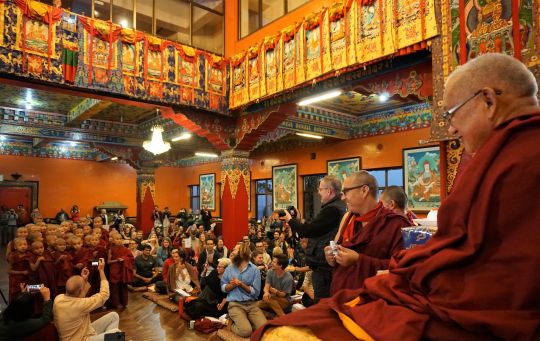
Cake being offered to Lama Zopa Rinpoche by November course participants while young monks sing ”Happy Birthday,” Kopan Monastery, Nepal, December 2016. Photo by Ven. Lobsang Sherab.
Lama Zopa Rinpoche’s birthday celebration was a fun and auspicious occasion. While cutting cake, Rinpoche explained how to think while doing this, that the knife is cutting all the delusions and self-cherishing. With every cake presented to him, Rinpoche did extensive offering prayers. Kopan’s young monks sang “Happy Birthday” to him as well, and put cheerful displays and messages wishing him a happy birthday around the monastery. It was Rinpoche’s 72nd Tibetan birthday (71st Western birthday).
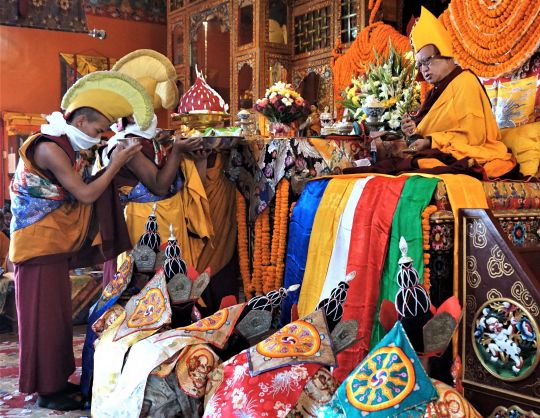
Offering tsog at the long life puja for Lama Zopa Rinpoche on the last day of the Kopan November course. The five dakinis are also shown. Kopan Monastery, Nepal, December 2016. Photo by Ven. Lobsang Sherab.
On the last day of the course, Lama Zopa Rinpoche was offered a long life puja with the five dakinis on behalf of the entire FPMT organization. The purpose of the long life puja is for students to purify the mistakes that occur in relation to their teacher, and to create the causes and conditions to continue to receive benefit from that teacher for a very long time. Lama Zopa Rinpoche also mentions regularly that offering long life pujas is a cause for one’s own long life.
After the puja, which was attended by 1,000 people, a picnic was offered for everyone, and lama dances and Sherpa dances were offered to Rinpoche. As is traditional, Rinpoche was presented a money offering at the end of the puja and Rinpoche chose to offer this toward the Sagarmatha Secondary School in Chailsa, Nepal.
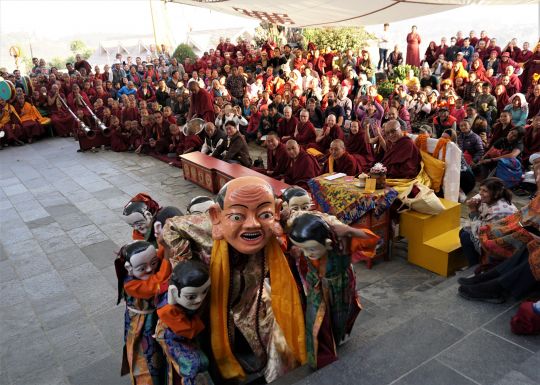
Lama Zopa Rinpoche watches a lama dance at the picnic after his long life puja, Kopan Monastery, Nepal, December 2016. Photo by Ven. Lobsang Sherab.
In the final days of the course, Rinpoche offered refuge to November course participants who sought it, gave a long life initiation to Rowaling people at Rowaling Gompa in Bouddhanath, just outside Kathmandu, and made light offerings at Bouddhanath Stupa, which had recently been reconsecrated after being damaged in Nepal’s April 2015 earthquake. He also gave course participants a special short teaching on 14th-15th century Tibetan yogi and iron bridge maker Thangtong Gyalpo, showing them a relic related to him.
FPMT Education Services offers a number of long life prayers for Lama Zopa Rinpoche on FPMT.org, all of which can be used in personal practice. Rinpoche has suggested that “Bestowing Supreme Immortality” is particularly effective as it was composed by Rinpoche’s root guru, His Holiness Kyabje Trijang Rinpoche.
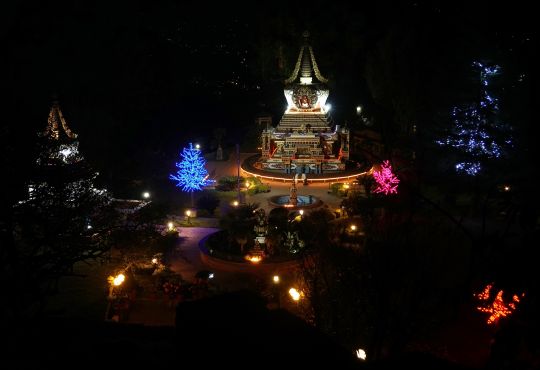
Light offerings around stupas at Kopan Monastery, Nepal, December 2016. Photo by Ven. Lobsang Sherab.
Read more about Kopan Monastery and its courses and activities:
http://www.kopanmonastery.com/
Donations to the Lama Zopa Rinpoche Long Life Puja Fund, which sponsors this yearly long life puja for Lama Zopa Rinpoche, are welcome.
Lama Zopa Rinpoche is the spiritual director of the Foundation for the Preservation of Mahayana Tradition (FPMT), a Tibetan Buddhist organization dedicated to the transmission of the Mahayana Buddhist tradition and values worldwide through teaching, meditation and community service.
- Tagged: kopan, kopan course, kopan course 2016, kopan monastery, lama zopa rinpoche, long life puja fund
- 0
7
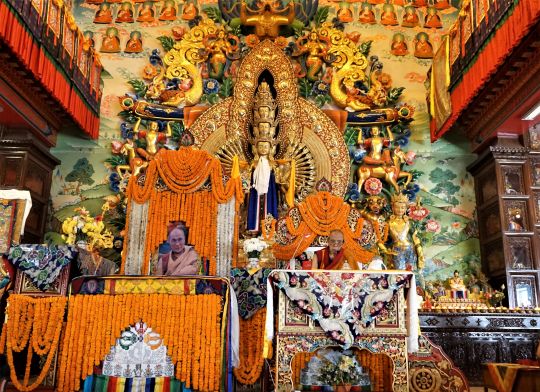
Rizong Rinpoche (beside a photograph of His Holiness the Dalai Lama) giving a White Tara empowerment at Kopan Nunnery, Nepal, November 22, 2016. Photo by Ven. Lobsang Sherab.
In November 2016, Rizong Rinpoche, recently retired as the 102nd Ganden Tripa (spiritual head of the Gelug school of Tibetan Buddhism), blessed Kopan Monastery and Nunnery with his presence over several days.
Rizong Rinpoche came to Nepal for the consecration of Boudhanath Stupa, which had been badly damaged in last year’s earthquake and is now restored. The consecration took place November 18-20 and prayers were done in all four of Tibetan traditions, with Rizong Rinpoche leading the Gelug contingent.
Rinpoche remained at Kopan for several other events: meeting Lama Zopa Rinpoche, Jhado Rinpoche, and the young reincarnation of Kopan’s beloved former abbot, Khensur Rinpoche Lama Lhundrup, whose name is Tenzin Rigsel Rinpoche; giving a White Tara empowerment; and being offered a long life puja. He also spent time, alongside Lama Zopa Rinpoche and others, observing debates among the Kopan nuns, two of whom recently completed geshema degrees.
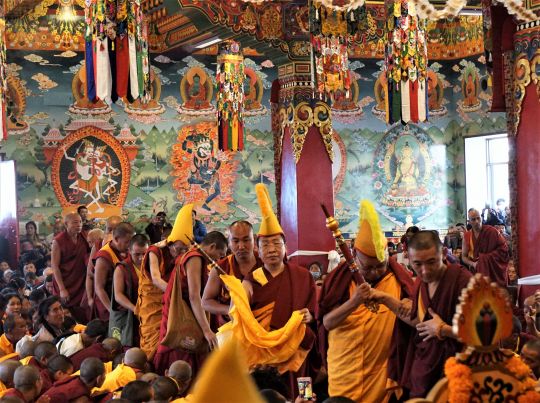
Lama Zopa Rinpoche leading Rizong Rinpoche into the gompa of Kopan Nunnery where he gave a White Tara empowerment and was offered a long life puja, November 22, 2016, Nepal. Photo by Ven. Lobsang Sherab.
The White Tara empowerment given by Rizong Rinpoche was attended by Lama Zopa Rinpoche, Jhado Rinpoche, and Kopan’s current abbot Khen Rinpoche Geshe Chonyi, as well as Kopan monks and nuns and hundreds of Tibetans.
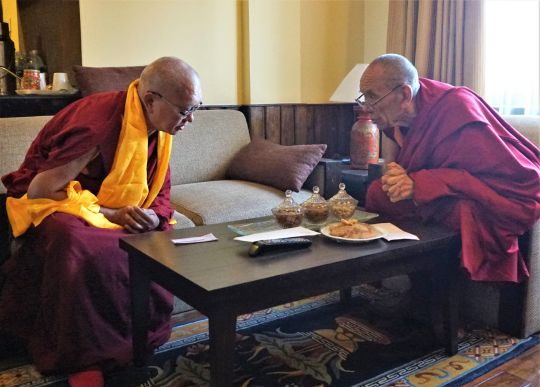
Lama Zopa Rinpoche and Rizong Rinpoche enjoy a conversation, Nepal, November 2016. Photo by Ven. Lobsang Sherab.
Read more about Kopan Monastery and its courses and activities:
http://www.kopanmonastery.com/
Read more about Kopan Nunnery and its two geshemas:
http://www.kopanmonastery.com/about-kopan/nunnery
https://fpmt.org/fpmt-community-news/news-around-the-world/two-kopan-nuns-take-final-exam-for-geshema-degree/
Lama Zopa Rinpoche is the spiritual director of the Foundation for the Preservation of Mahayana Tradition (FPMT), a Tibetan Buddhist organization dedicated to the transmission of the Mahayana Buddhist tradition and values worldwide through teaching, meditation and community service.
- Tagged: kopan, lama zopa rinpoche, rizong rinpoche, white tara
- 0
- Home
- News/Media
- Study & Practice
- About FPMT Education Services
- Latest News
- Programs
- New to Buddhism?
- Buddhist Mind Science: Activating Your Potential
- Heart Advice for Death and Dying
- Discovering Buddhism
- Living in the Path
- Exploring Buddhism
- FPMT Basic Program
- FPMT Masters Program
- FPMT In-Depth Meditation Training
- Maitripa College
- Lotsawa Rinchen Zangpo Translator Program
- Universal Education for Compassion & Wisdom
- Online Learning Center
- Prayers & Practice Materials
- Overview of Prayers & Practices
- Full Catalogue of Prayers & Practice Materials
- Explore Popular Topics
- Benefiting Animals
- Chenrezig Resources
- Death & Dying Resources
- Lama Chopa (Guru Puja)
- Lama Zopa Rinpoche: Compendium of Precious Instructions
- Lama Zopa Rinpoche: Life Practice Advice
- Lama Zopa Rinpoche Practice Series
- Lamrim Resources
- Mantras
- Prayer Book Updates
- Purification Practices
- Sutras
- Thought Transformation (Lojong)
- Audio Materials
- Dharma Dates – Tibetan Calendar
- Translation Services
- Publishing Services
- Teachings and Advice
- Find Teachings and Advice
- Lama Zopa Rinpoche Advice Page
- Lama Zopa Rinpoche: Compendium of Precious Instructions
- Lama Zopa Rinpoche Video Teachings
- ༧སྐྱབས་རྗེ་བཟོད་པ་རིན་པོ་ཆེ་མཆོག་ནས་སྩལ་བའི་བཀའ་སློབ་བརྙན་འཕྲིན།
- Podcasts
- Lama Yeshe Wisdom Archive
- Buddhism FAQ
- Dharma for Young People
- Resources on Holy Objects
- Ways to Offer Support
- Centers
- Affiliates Area
- Teachers
- Projects
- Charitable Projects
- Make a Donation
- Applying for Grants
- News about Projects
- Other Projects within FPMT
- Support International Office
- Projects Photo Galleries
- Give Where Most Needed
- FPMT
- Shop
Translate*
*powered by Google TranslateTranslation of pages on fpmt.org is performed by Google Translate, a third party service which FPMT has no control over. The service provides automated computer translations that are only an approximation of the websites' original content. The translations should not be considered exact and only used as a rough guide.No desire means no emotional pain of attachment, anger and jealousy. There is peace, openness and space for genuine love and compassion to arise.







